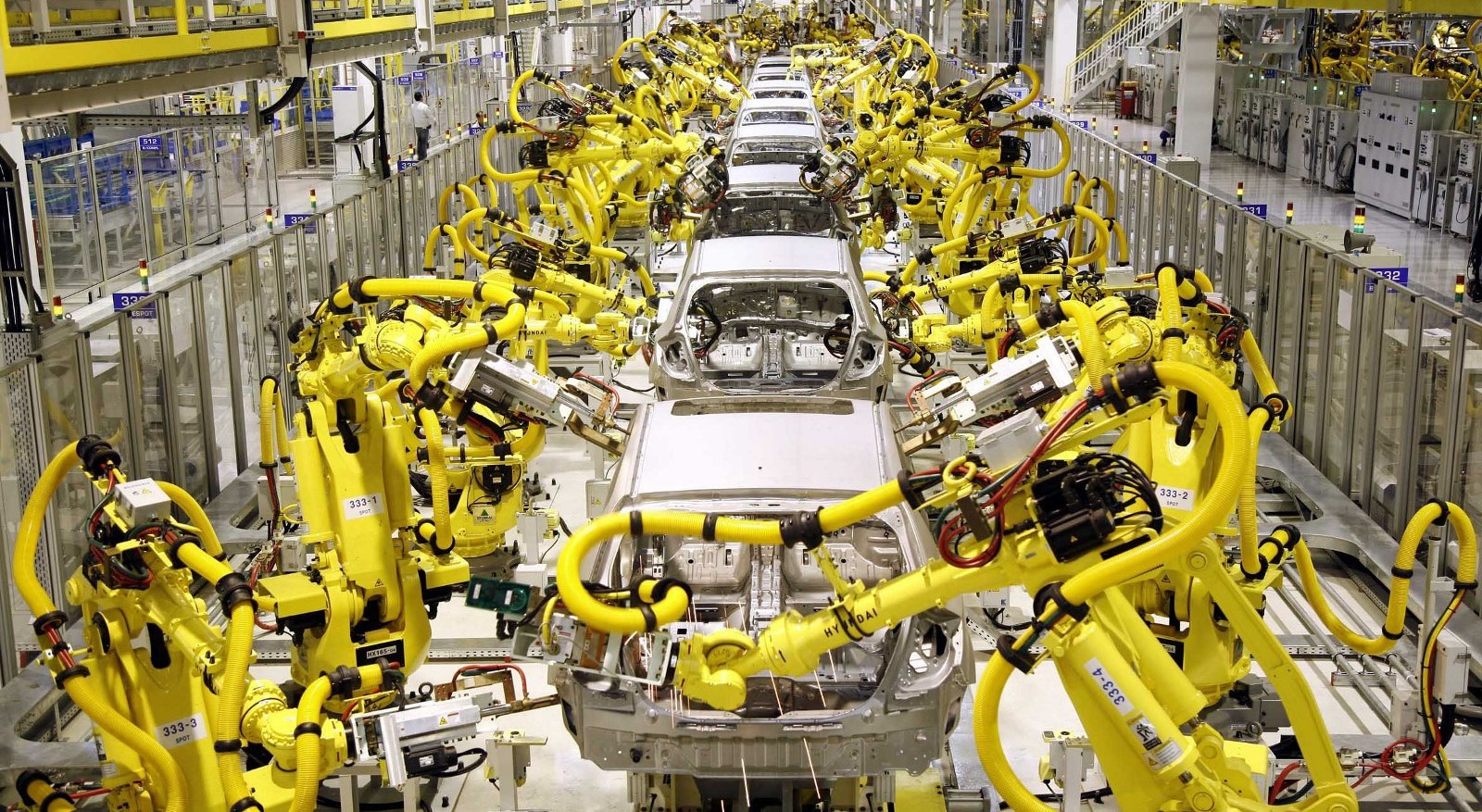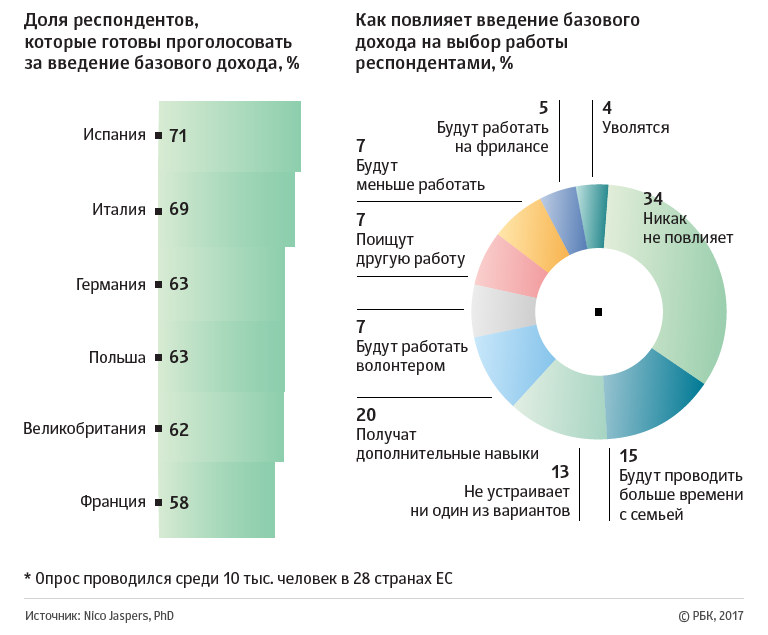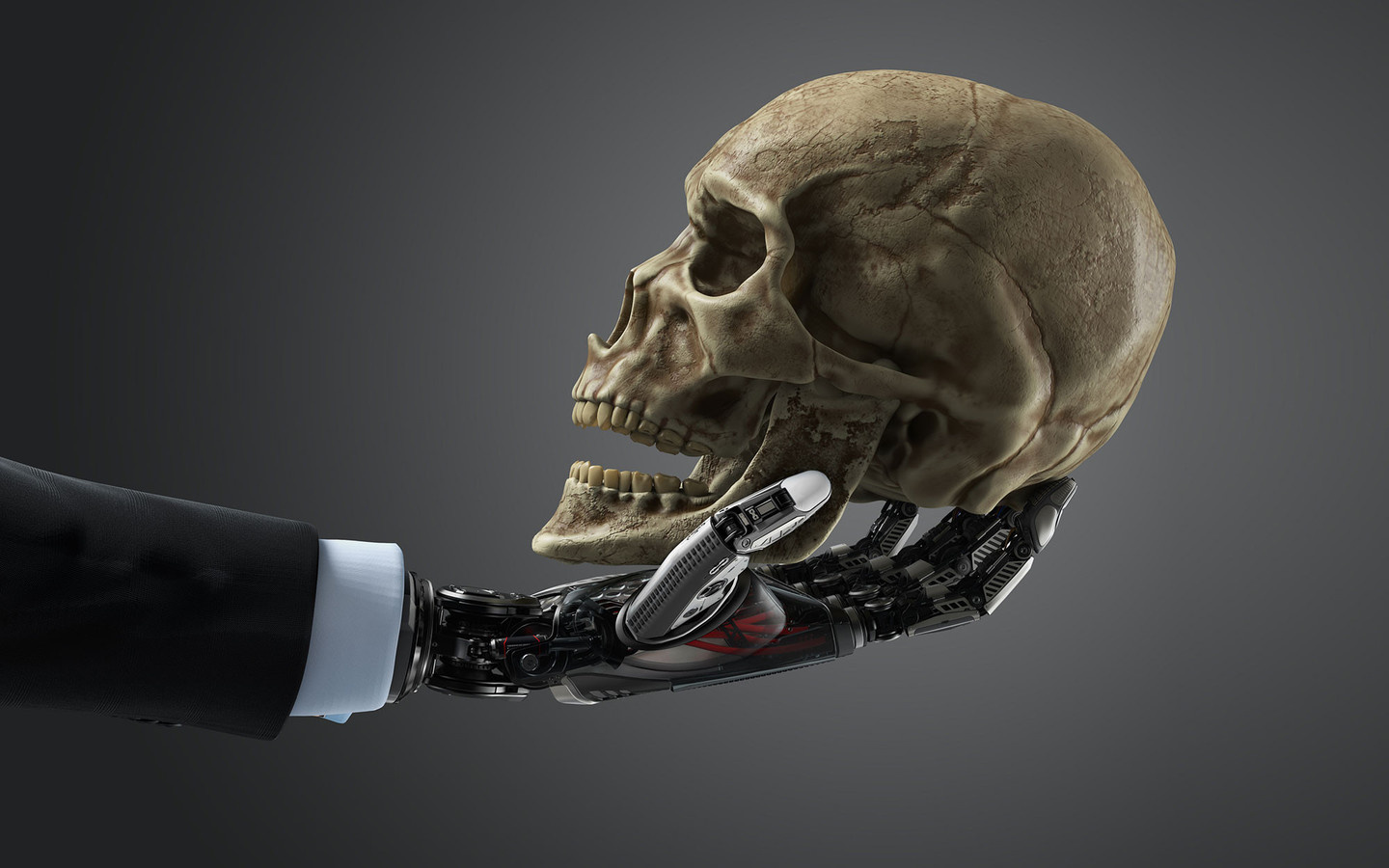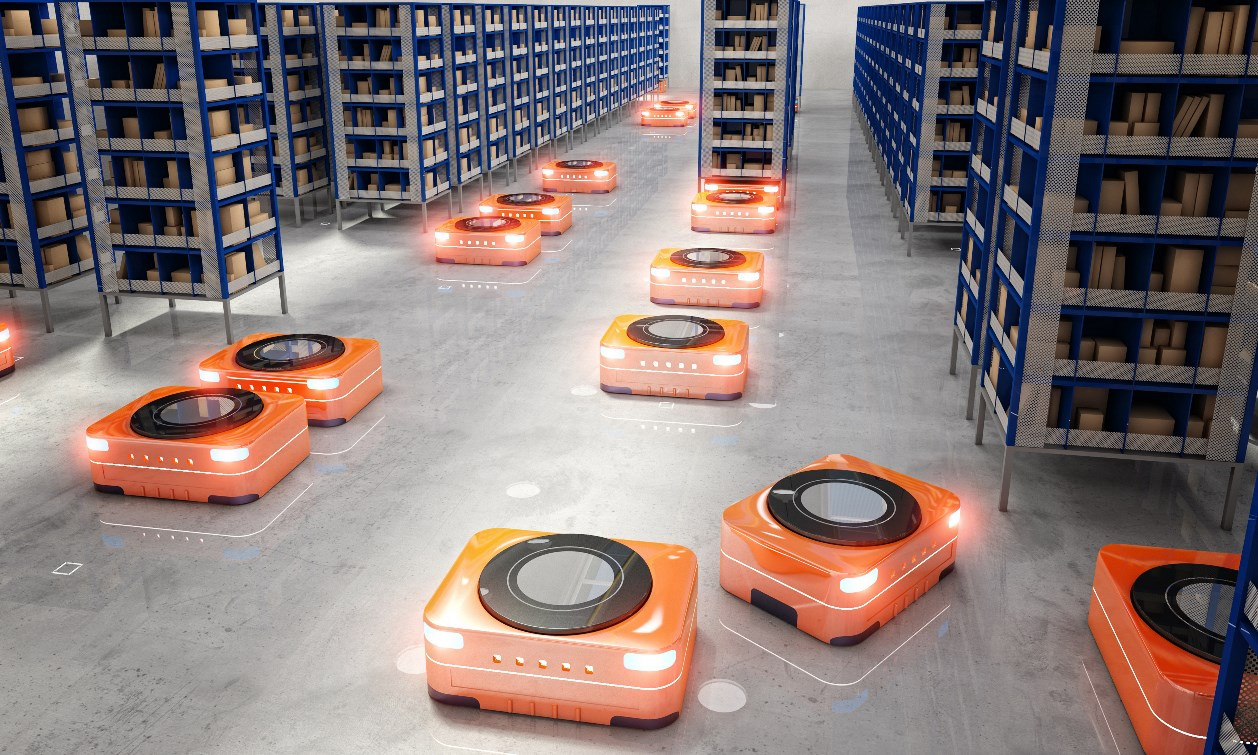Work and unemployment of the future: unconditional basic income

The future is not only the massive distribution of 3D printing, unmanned vehicles and the ubiquitous presence of robots. The future is also unemployment. By 2020, 5 million people will lose their jobs due to the development of artificial intelligence and robotics. This is data from the report of the World Economic Forum.
The factory management in the Chinese city of Dongguan replaced 90% of employees (650 people) with robots and automated systems. As shown by the first results , labor productivity has increased significantly - by 250%.
Even Sberbank plans to cut 3,000 jobs by the end of the year with the help of a bot that can write claims.
The “fourth industrial revolution” will lead to the disappearance of many professions, a crisis in the labor market, growing inequality and economic stratification. But before the masses remember the experience of the Luddites , new economic laws will play their part. Unconditional basic income - one of the tools designed to solve the problem.
What is basic income?

In its most general terms, unconditional basic income (BDB) is a concept that involves the regular payment of a certain amount of money to each community member by a state or another institution. Payments are made to all, regardless of income level and without the need to perform work.
This idea appeared a long time ago. Thomas Paine, in the book Agrarian Justice (1795), described the basic income paid by the authorities to all persons over the age of 21. For Payne, the main income meant that each person had a share in the total national production.
Back in 1943, the concept that everyone should have its share in the national wealth of the country was practically approved by the UK Parliament, but eventually the pay system was won depending on length of service, salary and other parameters, based on the ideas of William Beveridge . Lawmakers felt that the basic income venture would require too much funding.
There are a lot of nuances in the details of the BDB. How much money do you need to pay? Should this amount cover the basic needs of a person or should it be enough to get an education, certain material benefits? Where does one get so much money if the number of the working population is steadily decreasing?
There are no simple answers to the questions posed, but there are attempts to find a road that will lead to clarity. In 2017, several experiments are conducted that should show the effectiveness of the process of donating money from the state and non-profit organizations.
Unconditional income in different countries of the world
Africa
GiveDirectly Charitable Foundation launched a pilot version of unconditional basic income as early as 2011. The program covers the poorest regions - Kenya, Uganda and Rwanda. In GiveDirectly, we found out an amazing thing: with an increase in coverage, the number of people willing to receive money decreased. This is in a region where, in principle, there is no money!
In 2015, in the area of Homa Bay (Kenya), the number of residents who refused to pay was 45%. As it turned out , the problem has become common to all public organizations working in the area. Other development programs on HIV, water and sanitation, agricultural development, education, and women's empowerment also face resistance from local residents.
It is difficult for potential recipients to believe that some organization would unconditionally pay them a salary. As a result, many people began to invent various legends to explain what was happening. For example, they spread rumors that this money was connected with devil worship.
GiveDirectly was sponsored by the investment company Omidyar Network, created by eBay founder Pierre Omidyar. In Kenya alone, almost half a million dollars was allocated for the experiment. The duration of the event will be 12 years, and the number of participants will reach 26,000 people.
Certain results have been achieved right now: the economic activity of all participants in the experiment has increased by 17% over the year. This means that with BDB fewer participants are unemployed. A similar experiment, conducted from 2008 to 2009 in the Namibian settlements of Omitara and Ochivero, showed that the number of unemployed in the village decreased by 11%.
Total GiveDirectly received $ 23.7 million from various investors. 90% of these funds will be spent on payments to participants in the experiment, 10% will be spent on organizing the office, paying employees, taxes and other expenses.
In Uganda, another fund began operating - Eight, founded in 2015. Soon the 50 poorest families will receive a weekly weight of $ 8.60.
USA
Repeating in the US what has been done in Africa has proven problematic. If in the poorest villages it is enough to give out a few dollars - and significantly affect the living conditions of the population - then in America even a few hundred dollars will not have a noticeable impact.
Attempts to do the impossible are being made. The venture fund Y Combinator in 2017 plans to begin a five-year study of the impact of BDB on society. The project budget will be $ 5 million. The money is planned to be spent on residents of one of the most disadvantaged cities in California. In 2005, the city of Auckland ranked first in homicide rates in the state and tenth in the United States among cities with a population of more than 250,000.
A hundred families with children from different ethnic and socioeconomic backgrounds, with a monthly income of $ 1,000 to $ 2,000, will become participants in the pilot program. They will without any restrictions begin to pay more than $ 1000 per month.
Europe
A two-year experiment has already started in Finland. It began in January 2017 for two thousand unemployed citizens selected at random. They receive € 560 per month regardless of other sources of income.
Some participants in the Finnish experiment have already shared their first impressions. They started doing extra work, paid more taxes and spent more money on consumption. Many, having received financial guarantees, thought about the development of their own start-ups. An interesting observation - the experiment participants noted a decrease in anxiety and depressive moods.
In the Netherlands, the project starts in the city of Utrecht. Participants in the Utrecht experiment will receive monthly benefits of € 900 per person (€ 1,300 per couple). Different groups of participants will exist according to different rules, among them there will be a control group by which they will calibrate the results.
In Italy, the project started in June 2016: the 100 poorest families receive $ 537 from the city budget.
Unconditional payment mechanics
Explanatory video for the payment experiment in Finland.
The above experiments, which are conducted in different parts of the world, are only part of a worldwide research project. BDB is paid worldwide — from Canada to India. So far, the program covers only a few hundred people and is supported by private investors.
What happens if the concept of unconditional basic income confirms its viability? Is it possible to scale the effect from one village to the size of at least a city in any developed country?
Answers to these questions should be laid in the very economic model of the states of the future. Money is not taken from the air. Unconditional income combines already existing social and subsidized payments. To start paying, you need to cancel all social benefits, including unemployment benefits, abolish the pension, reduce the bureaucracy, pay education and medicine, raise taxes and introduce several other unpopular measures.
So far, there is no answer to the question of how, in the long term, the basic income affects a person’s desire to develop. The most large-scale economic experiment on this topic was conducted only two years (from 1975 to 1977) in the Canadian town of Dauphin. Any of the 12 thousand inhabitants of this locality was entitled to an annual income of at least a certain amount - they were paid extra for every dollar earned.
As a result, among the recipients of such benefits, the level of hospitalization decreased by 8.5% compared with the control group. More adolescents began to finish school, rather than quit it to look for income, and eventually found a better paying job than their peers. Mothers began to devote more time to caring for children, while the breadwinners did not begin to reduce their employment and compensate for the drop in income with benefits. That is, people in general wanted to work, even if they were offered the opportunity not to do it.
Advantages and disadvantages

Proponents of economic progress believe that basic income will solve the problem of poverty and unemployment, reduce the cost of servicing the state apparatus, reduce the problem of economic inequality, and allow people to do what they want. In addition, the idea of demanding payment for the use of the common wealth and natural resources of the country attracts many from a moral point of view.

But even if all the advantages are reduced to zero, one significant problem remains - unemployment caused by the emergence of a strong AI. Unconditional income is our resistance to a market in which human labor is worthless. People may think that it is wiser to get free medicine or go to a free school, but they can’t do anything about the contraction of the labor market. Even learning new skills at a certain point will lead to a dead end - computers will learn to do what was previously the prerogative of man.
At the same time, material benefits will not go anywhere - robots will create a product that will be sold to people for real money. There will be a problem of redistribution of surplus (from the point of view of society, not business). Part of the money can start paying people for creative work.
Opponents of the BDD often cite the example of Switzerland, in which they voted against the introduction of unconditional payments in a referendum. It should be borne in mind that people were not offered the most successful model - with very high wages, even by the standards of Europe, the basic payment would be 2,500 Swiss francs, but at the expense of tax increases. As a result, people lost significant money. And the problem of poverty or unemployment in the region is generally not significant.
It can be concluded that several factors need to be considered for the implementation of a BDB. We need a situation in which the state is easier and cheaper to guarantee a minimum-reasonable standard of living for all than to solve the problems of poverty, crime, unemployment, social inequality. There are more conditions for launching BDB in Africa than in the USA. To "turn on" this mechanism, you need to make a payment several times lower than the average salary of working people.
However, in poor countries, where it is enough to pay several hundred dollars, there is a risk of attracting “freebie lovers”, migrants, outcasts and other people who instead of entrepreneurship will start spending money on drugs and alcohol.
And there is another problem that has not yet been identified, but which economists guess is that man is always scarce. You quickly get used to good things, and expectations from life are growing rapidly. And the basic income, which from the first payment seems to be a solid foundation, very quickly “loses” in its value - I want “more gold”. For some, this is a way to find a new job, for others, to demand more money from the state (or private funds).
Conclusion: the era before the advent of AI

Amazon robots
Comparing the pros and cons, economists and philosophers come to the conclusion that the world at this stage of development is not ready for unconditional basic income.
It is necessary to raise labor productivity, make more goods and services than society can consume, transfer the economy to post-industrial standards of automation, and so on - all this can be done only with mass robotization.
When the machines "win" humanity will not need to raise a rebellion ... or perhaps need. In any case, the choice will remain with the person. In a world where there is an unconditional basic income, you can choose any job or not do anything.
All Articles